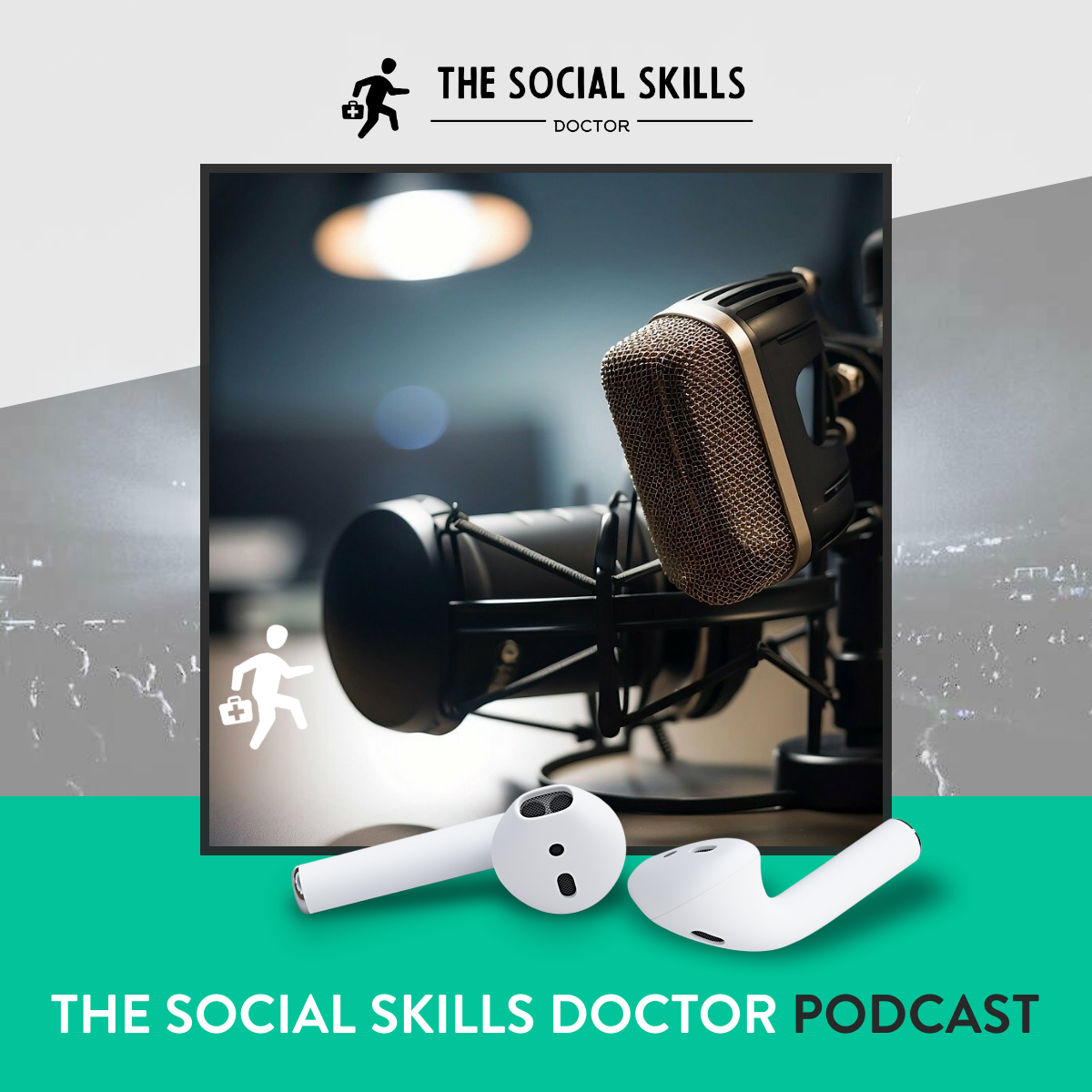Eliminate These Five Social Blind Spots to Improve Your Conversation Game
November 27, 2023

Communication skills are not just a nice-to-have, they are a game-changer that can propel you towards success in every aspect of your life. But sometimes it isn't just about learning new skills and practicing, it's about identifying and working out your bad habits and conversational blind spots too. In this article we will cover five of the biggest.
When every conversation feels like a car crash, sometimes the best way to move forward is to go back and identify your blind spots.
Communication skills are not just a nice-to-have, they are a game-changer that can propel you towards success in every aspect of your life. In personal relationships, conversational mastery is the key to winning the human race.
In a professional setting conversation skills are non-negotiable for career growth. Whether you're networking at industry events or navigating workplace dynamics with colleagues and managers. Adept conversational abilities will get you noticed as an influential communicator and enable you to confidently articulate your ideas during meetings or presentations.
So if you're ready to elevate your quality of life, enrich your relationships, and advance professionally, lets park everything I've just said and dive straight in with finding your conversation blind spots.
What makes a poor conversationalist

Here's a scenario: Somebody is sharing a piece of information, gossip, experience, or story with you, but you don’t have any particular interest in what they are saying, or they missed out an important part of the story and now you can't follow along, much less relate to it. You would like at the very least to ask a clarifying question, but they are on a roll and not stopping for breath.
I have just described my experiences of an older work colleague, the type of person who would frequently launch into rambling stories without giving any context first. A bit like reading a book without the benefit of a synopsis.
My colleague was hitting two blind social spots in one. First he didn't realize that his story-telling style was confusing, and second, he wasn't present enough to realize when his audience had lost focus and interest.
Becoming aware of your social blind spots by raising them into your conscious awareness will give you a quick win without having to do a thing except remedy some bad habits. We will now cover five of the biggest conversation blind spots and see how they can be turned into shining points of light for our personality.
Five blind spots of a poor conversationalist

1. The superficial one...
Conversations have different levels starting at the surface, where you can talk about anything in your shared environment to get the conversation going. You will then typically move from this superficial level to the information sharing level, and after a while you may go deeper to the opinions and the feelings level.
If the other person is revealing information about themselves but you are staying at the surface level and being guarded about sharing anything back then the conversation is unbalanced.
The blind spot. When someone comments about the weather or something trivial in the environment, the blind spot is not that you, or they, are making boring conversation, the blind spot is turning that ice-breaker into the main subject. Not communicating at the same level will result in no rapport, no connection, and probably no second meeting.
2. The quiet one...

When someone is talking you may feel like you need to make a witty or interesting reply, or respond with a thought-provoking question. If you don't or can't they will think less of you. This type of thinking often stems from shyness. In fact, to assume they will judge you negatively means YOU are the one judging THEM negatively.
The blind spot is thinking that there is safety in silence and nobody will judge you as stupid or boring if you don't give them anything to judge you on. The irony of course, is that your silence is more boring than a boring reply.
3. The self-involved one...

The self-involved person like my former work colleague, brings a very contrasting experience to the conversational table than the quiet person, but usually no less boring.
Most of us have that one hot button interest or soap box cause that can set us off. Others just seem to have a million stories or opinions just waiting to burst out of them. And it’s a wonderful thing to have such a fertile mind with lots of material. Unfortunately, that material can be a bit like a theme park for the self involved person to get lost in.
Because their stories and opinions are so entertaining and important (at least to them), they think it must also be for you too. And as a bonus, they think they are an excellent conversationalist because they can talk so much.
The blind spot. Not being able to tell a story without rambling, repetition, or an initial hook of interest. And not being socially intelligent enough to be aware when you have lost the attention of your listener.
4. The not listening one...

There is little worse than talking to someone and being able to sense that they are not listening. Either their attention is elseware, they are waiting their turn to speak, or they are not interested in what you are saying and don't have the social intelligence to conceal it.
Distracted people give themselves away very easily with their scattered attention, which is either bouncing around the room looking at other people, as though they need to be rescued, or they are checking out their phone. The not listening person will even respond too, or start a conversation with, someone else - while you are in mid-sentence!
While it has become the norm in a society with shorter attention spans, talking over the other person is also a sure sign someone is distracted by something they want to say and has prioritized it over letting you finish what you had to say.
The blind spot here is an absence of active listening skills and not having the presence to realize the lack of respect and poor interpersonal skills this is demonstrating to the other person. If you recognize yourself here, what you are doing is teaching the other person how to treat you in return.
5. The negative energy one...

Negative energy can manifest in the content of your words, or your physical presence. Lets call them negative and zero energy. Lets begin with negativity in general. This can be a one-off moan when you just need to get something off your chest. Friends will be fine with these occasional valve releases, but make it a regular thing and it starts to become your personality.
Negative energy can also come in the form of gossip which is used for bonding. But gossip is negative-centric and will ultimately leave a bad taste. When negativity becomes a habitual way of thinking, your mind becomes conditioned to looking for the negative slant on any new piece of information. Somebody announces an achievement and you marginalize it. For example:
- Big deal, anybody could have done that with a little practice.
- They probably did something bad to achieve that status.
- Why are they telling everybody? What makes them think we care?
Human beings are hopeful and aspirational by nature. When that turns negative, it's usually because of personal failure, or jealousy at the success of others. People want to be inspired by, and to associate with positive, aspiring people, not to have their energy drained by a mood hoover.
Zero energy. This is more about the absence of passion and having a victim mindset. If you haven't found any hobbies, activities, or people to get passionate about, then passion will be lacking from your body language and how you speak, such as:
- A monotone speaking voice
- Low speaking volume
- Lack of eye contact
- Disinterested body language
The blind spot is thinking the other person is enjoying your negative gossip as much as you, and that you are both bonding over the evisceration of someone else. In reality you are probably putting up their guard and making them wonder what you are saying about them in their absence.
Tips and tactics to improve your conversation game

Improving your conversation skills can greatly enhance your personal and professional relationships. Practice active listening, ask open-ended questions, and be mindful of non-verbal cues. Engage in meaningful conversations that allow for genuine connection and understanding with others.
Now we have looked at the five biggest issues responsible for a poor conversational experience, lets now address the same five blind spots but with tips and techniques to improve your conversation game.
1. Surface level. The most obvious example I ever came across of someone unable to connect with others was on a celebrity dating show. The celebrity who considered himself to be a good conversationalist, was set up with multiple blind dates, yet none of them ever wanted a second date. His frustration and confusion turned to denial when the unanimous feedback was that, while he asked about them, he was evasive about sharing anything about himself.
The learning point here is to be more open and more aware of when the conversation has moved beyond the surface level and into information sharing. i.e. sharing information about each other, your likes and dislikes, family, past experiences, career ambitions, hopes and dreams for the future etc
2. Being quiet. If being quiet is your thing, then chances are it's not the way you want to be. Shyness can truly distort and downgrade your self-worth and make you think whatever you say has such little value that others will think less of you, or simply smile indulgently. So the safest course of action is to say nothing.
Ironically the longer this goes on the more of a reputation you build for being the quiet one, and the more self-conscious you become when you do speak up. If this is your particular blind spot then you know what I have described is only the beginning of the problem.
The anxiety of the situation can cause your mind to tense up and go blank, and now you literally can't think of anything to say. On the occasion you do, you wait for an opening in the conversation, you wait and hesitate a little longer... then the topic shifts to something else and your input has just become redundant.
The first part of the solution is to switch to active listening. Now you may think you are already a good listener, but a good active listener will focus all their attention on what the other person is saying, while your attention may be split between the other person and the anxiety thoughts in your head.
True active listening will enable you to escape your own head and find your responses spontaneously from what the other person is sharing.
3. Being self-involved. There's nothing wrong with leading a conversation, but when you start to dominate it, or your stories don't have a beginning or end, this is when you start to harm your personal image.
The solution here is to develop your social intelligence. Think back to a few previous interactions and replay them while you observe from a fly-on-the-wall perspective.
- Are you talking over the other person to grab back the limelight?
- Do your stories take more than a minute or two to tell?
- Are people facing you with their whole body when you are speaking?
- Do they ever encourage you to get to the point when telling a story?
- Can you recognize when someone drops a hint they are ready to leave, and do you continue talking regardless?
If the answer is that you don't know then try to become more atuned to how others are responding to you. Become more empathetic to the social cues of others.
Allow each person to speak without interruption, ensuring that everyone has the opportunity to speak. When they are finished ask them a few follow up questions to let them know you were listening and interested in their thing.
When you speak, be clear and cut out any unnecessary elaboration, this will give you a more confident persona and ensure what you say resonates better with others. Speak at a moderate pace, avoid rushing or mumbling, and use well-timed pauses between sentences or thoughts for emphasis. If your story-telling is letting you down, there are many resources for improving your skills in this area.
4. Not listening. The opposite of someone not listening is someone actively listening, and most of us fall somewhere inbetween the two. For every one-percent nearer you are to active listening on this scale, you will be one-percent more successful in life. To become more successful in life and social interactions then:
- Practice active listening
- Maintain good eye contact with the speaker
- Nod occasionally to show you are listening
- Refrain from interrupting or finishing their sentences.
- Ask a few follow up questions
5. Negative energy. It can take time to train yourself out of negative thinking once you have gotten into the habit, but it's far from impossible to change. First things first:
Give yourself something positive to look forward to. Resentment often surfaces when seeing others living a better life than you. Instead of looking outward, look within and find your passion to focus on instead. Give yourself a goal to aim for and start working toward it.
Change your inner dialogue. Whenever you use a negative word against yourself or others in your mind, edit yourself and substitute the negative word for a positive one. For example if you regularly call yourself stupid, try substituting it for the word pretty instead.
Change your physiology. We've all heard that smiling can make you feel better, but so too can better posture. It raises you up and makes you feel more confident. Relax your muscles at the same time and you will also project a more positive and at-ease-with-yourself image.
Zero energy. When you begin to give yourself purpose and something to work toward, you raise yourself up and gossip stays beneath you. When you train out the negative inner voice you take away the judgement and feel less toxic. Add physiological improvements and you complete a three-pronged approach to transforming negative energy into positive.
Conclusion
Blind spots by their very nature are hidden from you, so don't be too hard on yourself if anything covered here has hit close to home. And if you're about to call yourself something negative, then let your inner dialogue retraining begin right now by substituting any negative words for positive ones.
If you want to go deeper on any areas of developing social skills, consider signing up for our introductory social & emotional intelligence masterclass & get the social skills doctor high speed brain newsletter, and learn more about our world exclusive approach to social skills development with the world exclusive Multiversal Mind Method please visit the website at https://.thesocialskillsdoctor.com